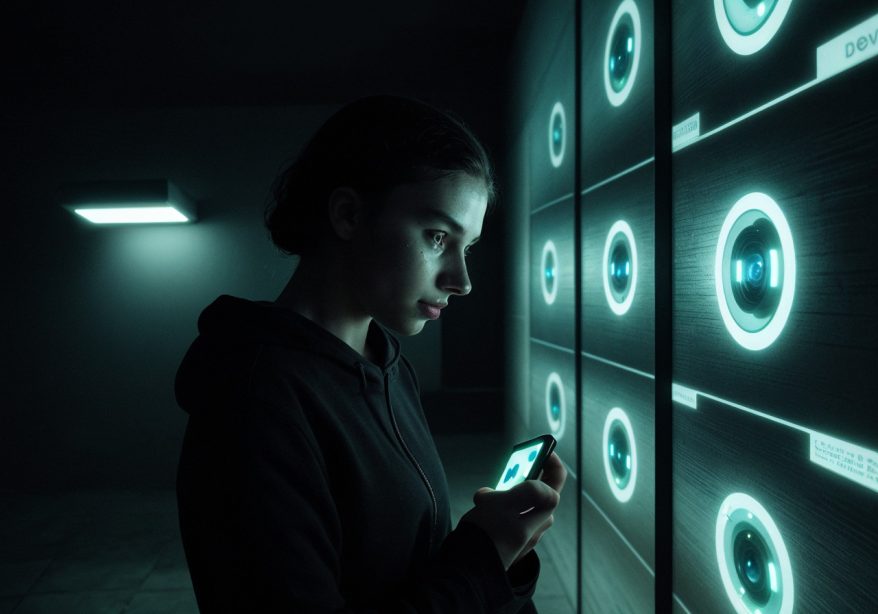You didn’t think much of it at first. An evening spent with friends, talking about stock market tips over coffee. One of them mentioned Coty, a cosmetics company, and a few upcoming products they thought had strong potential. Later that night, as you scroll through Instagram, something feels… off. Ads for makeup flood your feed, and even suggested posts seem eerily focused on cosmetics. It’s strange because you’ve never searched for makeup, never liked a single related post. That’s when it hits you: your phone—or maybe the apps—are spying on you.
The realization isn’t just unsettling; it’s a wake-up call.
The Descent into Digital Paranoia:
For days, the idea gnaws at you. You replay the conversation in your mind, scouring for any possible explanation. But the conclusion seems unavoidable: your privacy has been violated in ways you didn’t think possible. It’s not just about targeted ads anymore—it’s about the creeping sensation that every word, every movement, is being monitored.
Determined to take back control, you dive headfirst into research. Late nights are spent scouring forums and guides, learning how to lock down your digital life. You start with the obvious steps:
- Social Media Cleanup:
- Instagram is uninstalled, replaced with an older version from 2020, which feels less invasive.
- TikTok and X are deleted entirely, their apps too suspicious to trust.
- BlueSky and Vero become your new platforms—smaller, niche communities where you feel safer.
- VPN and Camera Taping:
Websites don’t just track cookies; they track how your mouse moves. Your mouse movements. Patterns of how you scroll, click, and navigate pages can be fingerprinted, creating a unique digital profile that follows you across the web.
- You install a VPN to mask your IP address, feeling a small but tangible relief every time you see the “connected” notification.
- Your laptop’s camera gets taped over, a simple but symbolic act of defiance.
- App Permissions:
- No app gets access to your microphone or camera anymore. Instead, you upload pre-recorded files if needed.
For a moment, it feels like you’ve regained some control. But the deeper you dig, the darker it gets.
The Creepiness of Cursor Tracking:
One night, you stumble upon a detail that makes your skin crawl. Websites don’t just track cookies; they track how your mouse moves. Your mouse movements. Patterns of how you scroll, click, and navigate pages can be fingerprinted, creating a unique digital profile that follows you across the web. The idea sends a chill down your spine—it’s like being followed, even in spaces you thought were private.
You find a solution. It’s clunky and tedious, but it works:
- Host File Edits: Blocking known trackers through your device’s host file ensures they never connect to your system.
- Fake Mouse Movements: You spend hours perfecting AutoHotkey scripts to simulate random, chaotic cursor activity. When websites try to track you, they see nothing but nonsense.
It’s exhausting work, but for the first time in weeks, you feel like you’ve won a small victory. Websites no longer seem to “know” you. The targeted ads dry up, and your feeds feel blissfully impersonal. You savor the silence, the absence of the invisible gaze.
The New Intrusion:
One evening, while scrolling through videos, you come across an inspiring talk about self-improvement. The speaker is captivating, their words hitting you like a spark of motivation. But something about them seems off. They mention being part of the Order of the Dark Sun, a name that sticks in your mind like a splinter.
You remember hearing about black sun symbolism—how it’s been co-opted by extremist groups, including Nazis. Unease sets in. You grab your phone and start Googling:
- “Order of the Dark Sun meaning”
- “Order of the Dark Sun Nazis”
- “Is the Order of the Dark Sun a cult?”
The search results are vague, a mishmash of conspiracy theories and cryptic forums. The unease lingers, growing heavier as the night deepens.
A Dark Encounter:
You decide to walk home, hoping the fresh air will clear your head. It’s late, and the streets are eerily quiet, shadows stretching long under dim streetlights. The sound of footsteps echoes behind you. Turning, you see her.
She’s towering—easily over 190 cm—and moves with a predatory grace. Before you can react, she closes the distance, her hand grabbing your crotch in a move that’s as shocking as it is disarming. Leaning in close, her voice is a whisper, but it cuts through the silence like a blade:
“No, we aren’t Nazis, and yes, you have what it takes.”
Her words send a jolt of adrenaline through you.
She steps back, her piercing gaze locking onto yours.
“My name is Lenina,” she says. “I represent the Order of the Dark Sun. Join us.”
She hands you a card with nothing but a symbol—an intricate, almost hypnotic black sun—and a time and place for a meeting. Without another word, she turns and disappears into the shadows, leaving you standing in the dim alley, heart pounding.
The Dilemma:
You stare at the card in your hand, its cryptic design seeming to pulse under the streetlights. The Order of the Dark Sun has found you. And whether you like it or not, your journey into the unknown has just begun.
This episode is a fictional exploration of the creeping erosion of privacy in the digital age, combined with an introduction to a mysterious and unsettling organization. The events described are speculative entertainment and not based on real events or entities.

